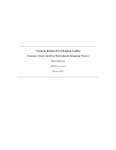Taking the Religion Out of Religious Conflict: Economic Theory and Other Motivations in Intergroup Violence

View/
Author
Reibach, Rachel E.
Subject
Washington and Lee University -- Capstone in Middle East and South Asia Studies
Political atrocities
Religious aspects
Mintorities
Political atrocities
Social conflict -- Religious aspects
Identity politics
Economics
Metadata
Show full item recordDescription
Capstone; [FULL-TEXT FREELY AVAILABLE ONLINE] Rachel E. Reibach is a member of the Class of 2018 of Washington and Lee University. In matters of religious, ethnic, or political conflict, identities are relatively permanent and unchanging factors. Due to the constant nature of these identities, any increase in rates of conflict or violence must be due to the change in other, more dynamic underlying factors. This paper seeks to examine the alternative explanations of seemingly “religious” conflicts in both South Asia and the Middle East through the lens of identity, behavior and conflict economics. The paper attempts to highlight economic and political struggles within the greater context of the Hindu-Muslim and Israeli-Palestinian conflicts, both geographically and in accordance with majority/minority dynamics in a cross-country analysis. These two conflicts provide interesting case studies because of their post-colonial conceptions, the arbitrary establishment of borders and intensification of identity factors. The analysis is centered on a utility function, subject to an actor's preference for consumption, “meanness”, and an identity parameter. The implications of the identity parameter are due to the weight held in the identity, and not the ideology of the religion itself. Incentives for “meanness” are influenced and manipulated by factors outside of the religion itself. The simplicity of the model is in its variables, and the complexity is in what changes the variables, demonstrates the importance of political, economic, and social manipulation. Rachel Reibach